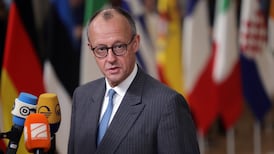Armin Laschet should be savouring this moment, his elevation to the ranks of Europe's political super league.
The 60-year-old native of Aachen in Germany's southwest claims a family connection to the ninth-century King of the Franks, Charlemagne, later the first Holy Roman Emperor. A fine pedigree for the leader of Germany's centre-right Christian Democratic Union (CDU) that has ruled Germany for more than half a century since 1949.
At the moment, though, Laschet looks less like a successor to Adenauer and Kohl and more like a shellshocked pub landlord, cigarette dangling from his lower lip and broom in hand as he surveys the damage from the night before.
Once the CDU prided itself as being the party of power and political discipline, but a very public brawl with its bossy Bavarian sister, the Christian Social Union (CSU), has left a trail of broken furniture and shattered glass.
Weeks of battle ended only after the CDU steering committee intervened to install Laschet as its election candidate, prompting revolt among ordinary party members.
Now he has to calm them and retool Europe’s largest political machine in just five months: a daunting task for this miner’s son, father of three and practising Catholic.
A law graduate, Laschet joined the CDU as an 18 year old, then worked as a journalist before a term in the Bundestag in the mid-1990s. After a subsequent term in the European Parliament, he was plucked to join the state government in North Rhine-Westphalia.
Shadow casters
In 2017 he turned around uninspiring polls to snatch the post of minister president, but he needs even more luck this time around given the three men casting a shadow over his chancellery bid.
The first is Markus Söder, the 54-year-old Bavarian minister president and CSU leader who electrified many with his recent bid for the CDU/CSU nomination. He was blocked on high by the CDU, fearing his mé féin populist style, but his concession speech last week had a threatening “I’ll be back” air about it. Since then he has insisted he is “not convinced” by Laschet.
Another shadow is cast by Friedrich Merz, a conservative-liberal lawyer and former CDU general secretary, who was ousted by his leader Angela Merkel back in 2002 when she sniffed his ambition and ability.
By now Merz has had more comeback attempts than Sinatra and, after losing out in January’s party leadership race to Laschet, he has suddenly fallen into line to back him – sparking rumours of a deal to bring the still ambitious Merkel rival into cabinet after September’s election.
The final man overshadowing Laschet’s campaign is Bundestag president and former finance minister Wolfgang Schäuble. Like Merz, he was ousted by Merkel, in his case as CDU leader more than 20 years ago. After half a century in politics, he is wary of the CSU and, according to informed sources, Schäuble was the key figure in last week’s high-stakes push-back against Söder.
Schäuble is running again in September and will remain the grey, inscrutable eminence in the post-Merkel era.
False friends
With impatient rivals and false friends circling him in Berlin, Laschet now has to come up with an election manifesto to win over voters with the right amount of continuity and distance to Angela Merkel. That means acknowledging her successes – how she rode an inherited prosperity wave and maintained relative stability at home during unprecedented crises – while acknowledging the scale of Germany's reform backlog, which was exposed in the pandemic.
“We need to clean out bureaucracy, create a modern and service-oriented state that acts quickly and with foresight,” Laschet said.
After four Merkel terms, when his party glided from one election win to the next, Laschet is up against the clock in his search for winning ideas to secure a fifth term without her.
In the last years, the CDU/CSU identity shrank from being Germany’s last uniting political movement to being the bloc against which no one else could form a government.
Now that strategic potential has passed to the Green Party. With two CDU-free coalition alternatives in its back pocket, the Greens are breathing down the CDU leader's neck as a potential coalition partner.
Armin Laschet may not be the most exciting candidate of all time but, with him in place, the election race can begin. Suddenly, German politics is getting very interesting.




















